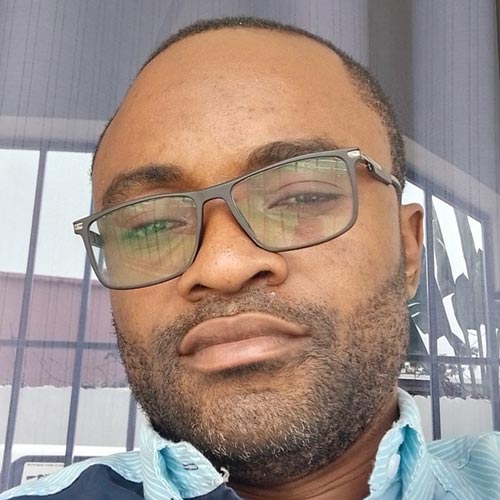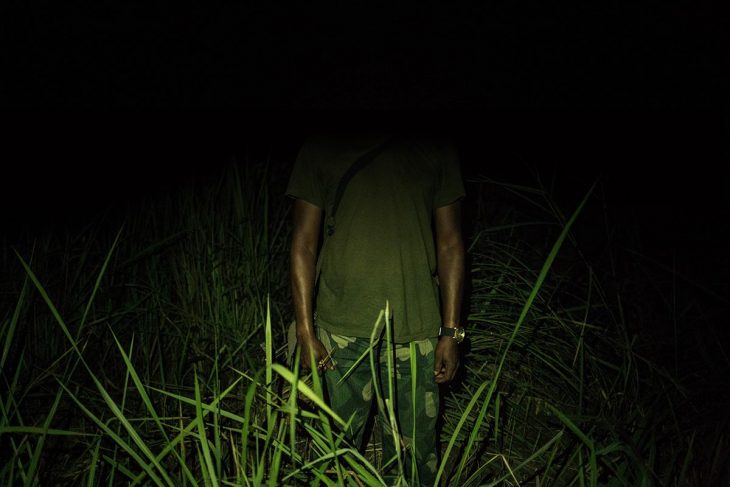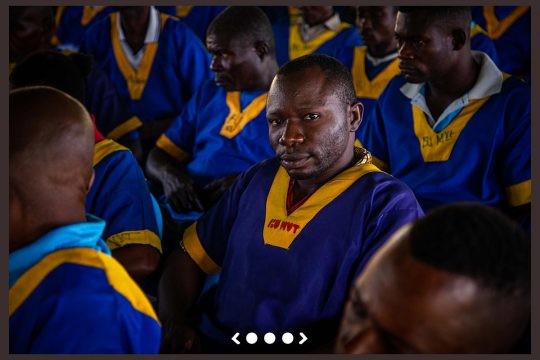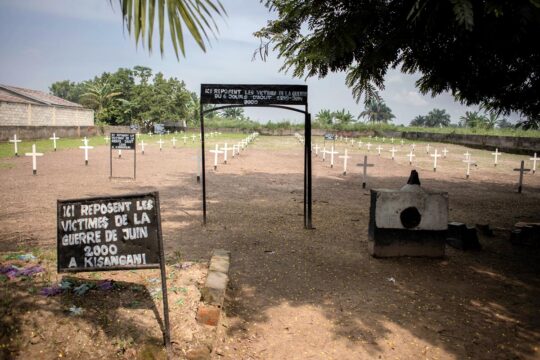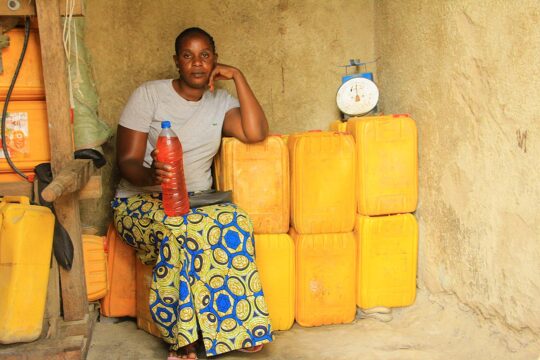Between December 16 and 18, 2018, when the Democratic Republic of Congo (DRC) was gripped by a parliamentary and presidential election campaign, the western territory of Yumbi -- where the river marks the border between the two Congos -- plunged into unprecedented violence. Tensions surrounding the burial site of a Banunu traditional leader led to clashes between Batende and Banunu communities. For three days, there were bloody attacks in several localities in Yumbi, which lies some 300 kilometres from the capital Kinshasa. At least 535 people were killed, according to the United Nations Joint Human Rights Office, and 461 according to the government. Both reports point to the involvement of political and administrative authorities.
On May 25, 2021, the hearing that was supposed to mark the beginning of the trial lasted only a few minutes. The case was immediately postponed, and finally resumed on August 6. The 80 or so defendants were charged with eight counts, including crimes against humanity, criminal association and arson. Sixty-seven defendants, including one woman, are being held in the Ndolo military prison in Kinshasa. Others are either on provisional release or on the run. 375 people have filed civil suits.
Weekly hearings on the ground
For the trial, the High Military Court opted for mobile hearings, sitting every Friday in the Ndolo prison compound, under a green canvas tent. The defendants sit in the middle, facing the members of the court. They are all dressed in blue and yellow shirts with the words "court hearing" on the back. On either side and behind them are lawyers, family members of victims or defendants, journalists and observers, as well as military personnel assigned to guard them.
While the lawyers plead in French, the defendants speak mainly in Lingala, the dominant local language in Kinshasa and in Mai-Ndombe province, where Yumbi is located. The president of the High Military Court, Freddy Mukendi Tshidianyama, also uses Lingala for his questioning. Some defendants systematically deny their own statements given during the preliminary investigation. Others go so far as to question the representative of the public prosecutor, Brigadier General Baseleba, denouncing his method of interrogation. "The general leads people to say things under duress," said a defence lawyer.
Authorities in the dock
The accused include members of the political and administrative authorities as well as members of the security forces. They are accused of being the instigators of the violence perpetrated in Yumbi, and were allegedly in contact with other defendants or were at the scene of the events. They include parliamentarian Mbanga Manzimi, who was campaigning at the time of the events, the provincial assembly member Nimba Mpele, and senior commissioner Mantshindi Mwisoni, who was territorial commander of the police at the time. There is also Monkasa Boboto, then director of the provincial Interior Minister’s office, and Bompinga Bongenzenze, acting head of the Banunu Bobangi group of villages. They are appearing as free men, as decided by the prosecutor. The prosecution says there is ample proof of their guilt, but they say they are innocent.
Among those on provisional release is an agent of the National Intelligence Agency (ANR) who has never appeared in court. He claims that the high court must first obtain authorization from the ANR administrator, according to a source close to the case. He is being tried in absentia.
The court is seeking to understand the role that each played in the attacks and what they did to prevent the violence. The prosecution claims that Commissioner Mantshindi encouraged the Batende to harm the Banunu. It alleges complicity in crimes against humanity with regard to a severed human hand that the local chief Mbaka Matalatala (in detention) allegedly brought to the police officer Mombeno (in detention). But the defence questions that the event even took place and demands to see the evidence.
The shadow of the Kinshasa governor
One of the defining moments of the trial so far was when the court evoked a telephone conversation between a defendant and Gentiny Ngobila, who was governor of Mai-Ndombe at the time and is now the governor of Kinshasa. The audience suddenly became more attentive. The defendant in question is called Jean-Pierre Ngamama Penge, former head in Bolobo of the General Directorate of Revenue of Mai-Ndombe province. He is allegedly involved in the supply of ammunition. The two men are said to have called each other extensively on December 14, 15 and 16, 2018.
Ngamama had previously denied being in communication with Ngobila, even claiming that his phone had been stolen. "If I had to report to any authority, it would be to Rita Bola, my direct supervisor," he said. Bola, known to be close to Ngobila, was the provincial head of the revenue department at the time and she is now the elected governor of the province.
Court president Tshidianyama then looked at a phone record that contained two text messages -- a 219-second call on the morning of December 14, and a 50-minute call the next morning. And Ngamama eventually agreed that he spoke with the current governor of Kinshasa, but to talk business, he said. According to him, he was the manager of a real estate property owned by Ngobila and was in charge of its oversight. "Let's hear this conversation," the audience murmured. But the recording has not yet been played publicly.
Ngobila has not been charged in this case, but he was heard by the commission of inquiry set up by the government after the massacres. This commission was composed of members from several ministries and was headed by the Minister of Human Rights, Marie-Ange Mushobekwa. Two months before the inquiry's report was released, Mushobekwa had, in an interview with Radio France Internationale, presented Ngobila as "a key witness for the trial”. "It is obvious that the governor in office should have taken measures to stop the massacres. He will have to explain why they could not be stopped," she added. When the report was released in May 2019, she said it was up to the courts to determine Ngobila's responsibility. People who come to the hearings or talking on the street are asking: "What about Ngobila? What is being said about him? Will he be heard too, and when?”
A handful of witness testimonies
While less than half of the defendants have been heard, only four victims have testified to the court. They are designated by a code name to protect their identity and appear before the court with their faces and even bodies covered by a cloth. A microphone allows their testimony to be heard. In March, Victim 386 accused defendant Davin Mayongwe of arson, and police officer Lipasa with a murder committed on December 16, 2018. "Through a hole in the door, I saw unknown people, but also Davin, dressed in plantain leaves. He was told that there were people in that house. He put petrol, which he was carrying in a can, and set fire to that house. Those who were inside were screaming but he went out, with the others. On our way, we met the policeman Lipasa who shot at us and a young boy died on the spot. I was shot in the leg," Victim 386 recounted calmly. Davin rejects all the accusations. He said he does not know Victim 386 and that he was not in Yumbi town on the date mentioned as he left in November for Nganda ya Solu, about 190 kilometres away. It was from there that he learned about the unrest in Yumbi and the burning of houses, including his own, he said.
Victim 4040 accused Jerome, alias Kalonji. He claims to have been attacked by several people and to have recognized four of them, including Kalonji, who was carrying a machete. The defence sees this as a contradiction with his statements during the investigation, where he spoke of a "firearm”. 4040 stated that he still had "bulletshot" in his body and that his older brother's hand had been cut off. The accused denies the facts and says he recognizes the voice of the protected witness, even threatening to give his name.
Respectful but slow procedures
Both sides agree that the debates are being conducted properly. Two lawyers for the civil parties and the defence, interviewed by Justice Info, said that "on the form, everything is going well", and that "the procedure is respecting the law and rights of the defence". But both the defence and civil parties criticize the slow pace of the trial.
The court has held just 20 hearings in a year, the last one on April 8. According to sources within the military justice system, the president of the high court has spoken of the need to have two hearings per week from now on, as the other case being tried simultaneously in Ndolo prison - the appeal trial on the 2010 assassination of human rights activists Floribert Chebeya and Fidèle Bazana - ended on May 12.

